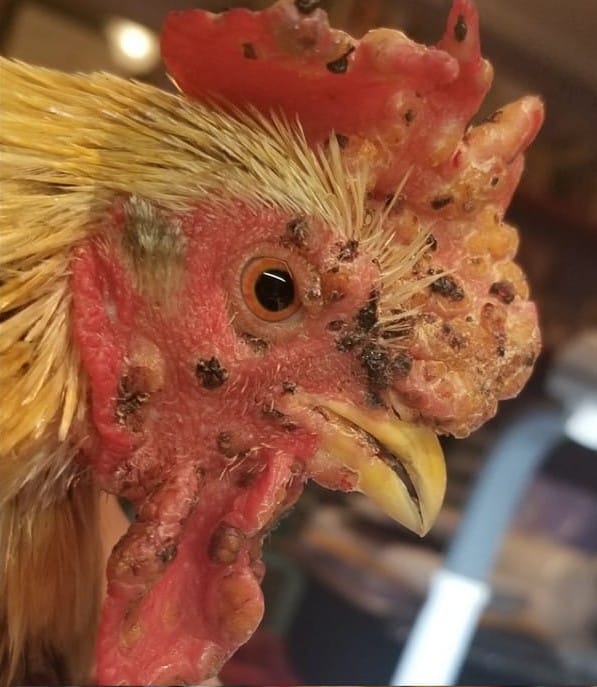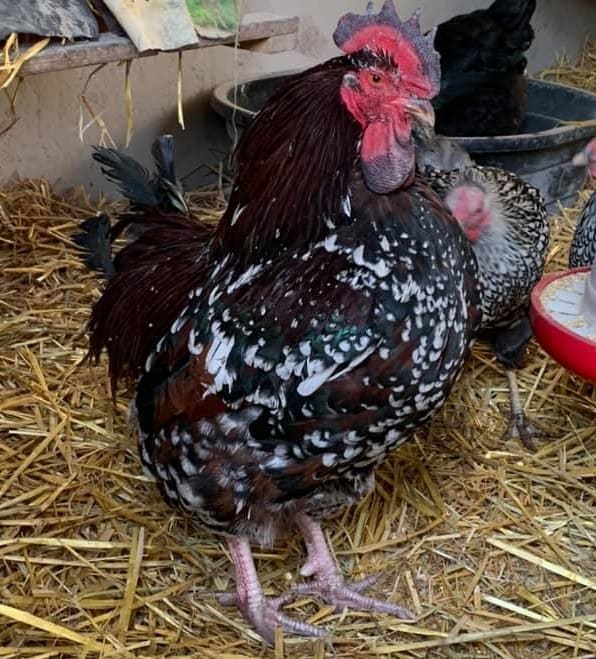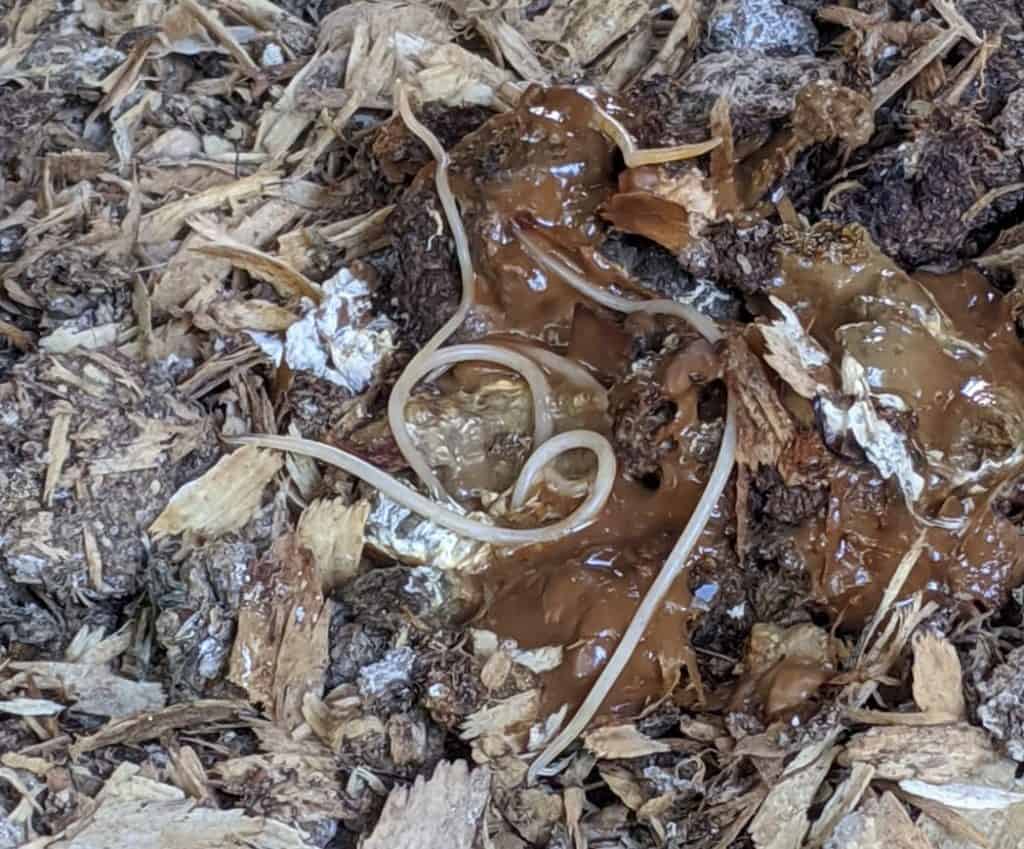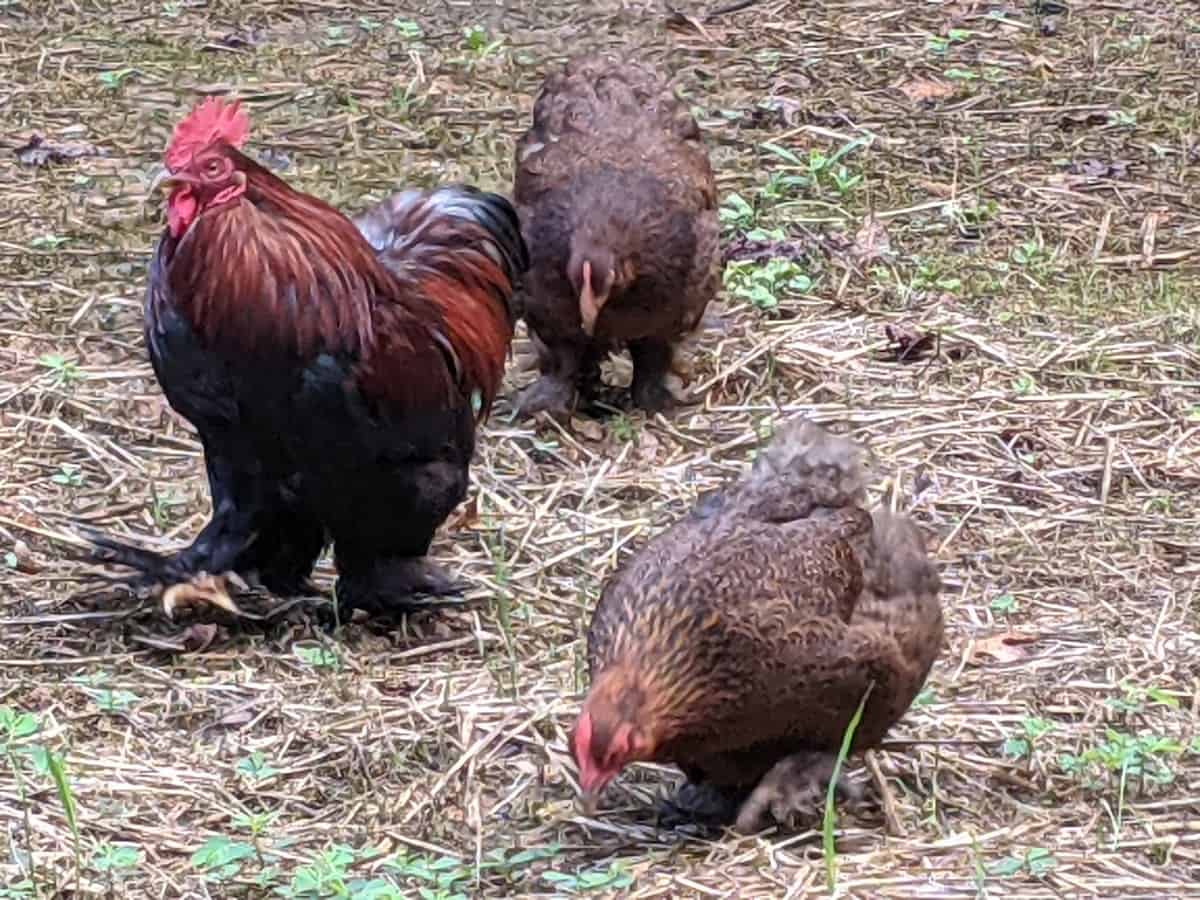As backyard chickens owners we always worry about the health of our chickens. We want to make sure they are living a healthy life in their coop and that they don’t get sick or have any illnesses.
Usually, when obvious symptoms are present, the chickens are quite sick, and prompt attention is needed.
Sick chickens will have altered behavior, movement, and appearance. Their feathers, combs, and wattles may be abnormal. A discharge from the eyes, nose, mouth, or cloaca may be seen. Diarrhea may be present. They may breathe rapidly with an open mouth or have shallow, labored breathing.
Detecting a sick chicken as quickly as possible is vital to enable you to treat the problem promptly. It is valuable to know what signs to look out for when observing and assessing your chickens.
- General Demeanour
- Feathers Indicate Health
- Absent Feathers In The Chicken’s Vent Or Cloacal Area
- What Combs And Wattles Tell Us About Chicken Health.
- Abnormal Breathing In Chickens.
- Chicken Stools Or Feces.
- Check the Crop
- What Do Eggs Tell Us About Chicken Health?
- How To Examine A Chicken.
- How Do You Know If A Chicken Is Dying?
- Simple ways to keep your chickens healthy
- Conclusion.
General Demeanour
Knowing your flock well is the first step in being a vigilant chicken owner. Take time to observe your healthy chickens every day when feeding them. You will soon notice individual behaviors and habits.
Sick or uncomfortable chickens will change their behavior and habits. These signs may be subtle such as being slow to get off the nest and come out to feed in the morning. The chicken may also eat very little due to loss of appetite or huddle up in a corner.
Symptoms of sick chickens include lethargy, drooping head, and lying flat on the ground.
Drooping wings can indicate that a chicken is too hot or sick. When you see unusual behavior in your chickens, consider the environmental conditions first – such as extreme heat, cold.
Check that the water supply has not been accidentally compromised. If the environment is normal, then start considering individual or flock illness or health conditions.
Feathers Indicate Health
Chickens’ feathers can be a good indicator of their health. The feathers should be bright and glossy with no bald spots. Chickens with ruffled feathers or missing feathers may be suffering from diseases. Stress, mites, fowl pox, Marek’s Disease, predator attack, or flock fighting could all be causes of poor feather health.
Molting or nesting chickens will lose feathers. If your chickens are molting, increase the protein in their diet to help feathers grow back. Poor feathering can predispose your chicken to other diseases.
It cannot keep warm, and the immune system will be weakened. If you suspect flock fighting, separate the injured chicken and keep it separate until it is healed and fully feathered. You may need to make permanent adjustments to the flock management if the fighting persists.

Absent Feathers In The Chicken’s Vent Or Cloacal Area
A chicken only has one opening for reproduction and excreting waste products. This opening is called the cloaca or the vent. If the feathers in the vent area are dirty, there is a strong possibility that your chicken has gastrointestinal issues.
A yellowish-white discharge that may be moist or crusty is often an indication of a Candida Albicans infection. This is a yeast or fungal infection and is sometimes called vent gleet.
Chicks may suffer from pasty butt. The chick’s vent area becomes plugged with thick pasty excrement, which causes the chick to become constipated. This condition is often caused by stress or sudden dietary changes.
What Combs And Wattles Tell Us About Chicken Health.
Combs and wattles that change color indicate disease or ill health in sick birds. Pale combs and wattles may indicate anemia due to disease, iron deficiency, or blood loss from injury, mites, lice, or worm infestation.
Chickens in shock may also have pale head parts. A bluish hue to the comb and wattles indicates an inadequate blood supply or hypothermia. If the chicken is dehydrated, the comb may flop over. Chickens that have been fighting or attacked by a predator often have fresh or dried blood on their head area.
The chicken’s comb helps the chicken regulate its temperature by increasing or decreasing blood supply in the comb. A chicken with a comb that has a more intense color than usual and is hot to the touch may be running a fever or be overheating.
Small grey or white spots on the comb, wattles, or face area indicate fowl or avian pox. The spots change into warty nodules as the disease progresses and become bloody, with scabs developing in non-feathered areas.

Frostbite is another condition that affects the wattles and combs in poultry. In the cold, there is a decreased blood supply to the extremities. Cold, wet conditions cause frostbite. A damp or poorly constructed chicken coop can be a contributing factor.
If the wattles are swollen the cause could be from a variety of factors such as an insect bite, stinging insects, or a reaction to a poisonous plant.
Abnormal Breathing In Chickens.
Consider your chicken’s breathing pattern. If all of your backyard chickens are breathing rapidly with their beaks open, they are probably over-heating or stressed. You should assist them in cooling down or remove the stressor. Shallow, slow breathing may be a sign of extreme stress and approaching death.
If there is a discharge from the nostrils or mouth, there is probably a respiratory illness such as bronchitis or sinusitis. This will require antibiotics and intensive nursing. Sneezing and coughing often accompany oral and nasal discharges.
The most common cause of sneezing and wheezing is a respiratory infection or a gapeworm. A sneeze here or there is not a cause for alarm, however. Sometimes my chickens will sneeze due to the dust particles from their feed getting in the air.
Chicken Stools Or Feces.
Chicken stools or feces that are watery and foul-smelling are an indication of diarrhea and gastrointestinal problems. These symptoms of illness could be a parasitic infestation or bacterial, viral, or fungal infection. Abnormal droppings or bloody droppings can be an indicator of illness.
You should also check the chicken manure for signs of parasitic worms.

Check the Crop
1. If the crop feels like a hard solid lump. Then this is a sign of an impacted crop. Too many fibrous greens, eating a long blade of grass, or layer pellets expanding due to drinking water right after eating are common causes of an impacted crop.
2. It feels like a balloon that is unable to empty. If you apply light pressure to the crop liquid may come out of the hen’s beak causing a nasal discharge. The liquid will have a fowl smell to it and a brown coloration most of the time.
What is Sour Crop? The crop of a chicken becomes sour when it does not fully empty. As a result, the contents may ferment, leading to a bacterial or yeast infection within the crop. Your chicken will start to eat less at the crop is full and unable to empty.
3. If the crop is empty. Then the chicken may not be eating because of a virus, illness, digestive issues, bullying by other hens, or other problems.
What Do Eggs Tell Us About Chicken Health?
Chicken eggs that have fragile shells indicate a calcium deficiency. Irregularities in the eggshell could show a bacterial infection such as mycoplasma. A drop in egg production could also indicate nutritional deficiencies or the onset of disease.
Eggs that have small cracks or markings could mean that the hens are stressed.
Periodically a strange soft mass of an egg may be laid. This is not an egg. It is a ball of pus that has come out of the cloaca and may include bits of shell or yolk. It is called a lash egg and is a symptom of an infection (usually staphylococcus) in the hen.
How To Examine A Chicken.
If you cannot see any symptoms from a distance, you may wish to examine the chicken. Always work gently and quietly to prevent stress.
- Capture the chicken with minimal stress. Hold the chicken firmly with the wings folded naturally against the body.
- Examine the chicken starting at the head, noting the color and conditions of the wattles, comb, and eyes. Look for discharge from the eyes, nose, or mouth. Work your way down the body, noting any feather loss.
- Part the feathers and examine the skin looking for red dots or moving parasites.
- You can gently open the beak and look inside to look for mucous or a putrid smell in the mouth or throat. Gently feel the crop taking care not to bruise or damage it while examining it.
- Examine the feathers in the vent area and the vent or cloaca itself. The cloaca should be moist and pink. Note any discharge.
- Examine the chicken’s legs and feet. Look for thickening or heat in the joints and feet. Note injuries or abnormalities in the skin.
- You can take the chicken’s temperature by gently inserting the tip of a thermometer into the cloaca. Chickens have a high normal temperature. The range is 105° F – 109°F (40,6° C – 41,7° C). If you would like to watch a video on this see below.
How Do You Know If A Chicken Is Dying?
Chickens that are dying may have a low body temperature, be limp, flaccid, and will have shallow, slow, or labored breathing, usually with an open beak.
There may be seizures where the chicken’s body spasms. If you have a stethoscope, you will hear a slow, irregular heartbeat. The eyes are often closed.
Simple ways to keep your chickens healthy
- Make sure your chickens have fresh drinking water daily
- Make sure your chicken feed is fresh and free of mold
- Don’t pour new feed over old feed.
- Clean our their feed container if you see old food build-up
- Give your flock new areas to peck and scratch in weekly if you can.
- Clean the coop out regularly as a build-up of chicken manure can cause issues over time.
- Clean out your water containers regularly as bacteria develop in them over time.
- Maintain regular inspections of your coop
- If your flock free-ranges like mine do make sure there are no poisonous plants, mushrooms or insect nests nearby that could harm your chickens.
Conclusion.
As backyard chicken keepers, it is important to know your chickens well so that you can spot any differences in behavior and appearance. Be on the lookout for discharges, ruffled feathers, injuries, and diarrhea.
If you think a chicken is sick, you can perform a basic examination to see if you can find any irregularities. Act quickly to prevent any spread of illness. Remember to handle your chickens calmly and keep stress levels low.

